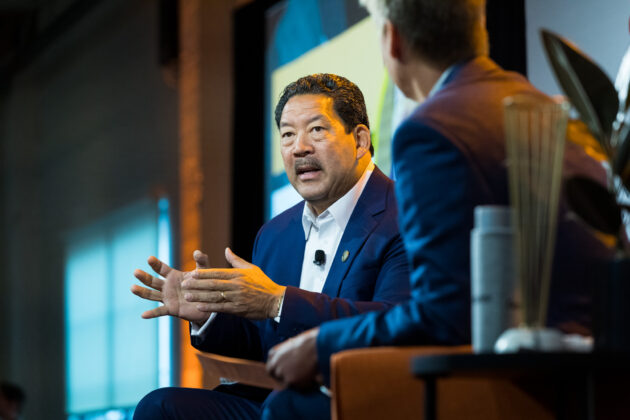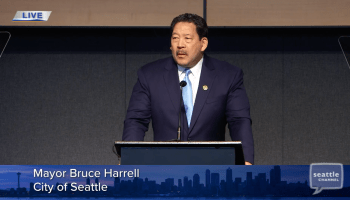
The City of Seattle won’t test a controversial gunshot detection technology system after all.
Mayor Bruce Harrell on Friday announced next steps for the city’s Crime Prevention Technology pilot project — which will no longer include the gunshot tech rollout.
It will instead feature the installation of closed-circuit television (CCTV) cameras in three neighborhoods with higher crime rates, as well as the use of “real-time crime center” software that can integrate multiple data sources to help with investigations.
The mayor’s announcement didn’t provide specifics as to why the gunshot detection product was not selected, but implied that it didn’t fit within the $1.8 million that the city had allocated for deploying crime prevention technologies.
“Now that more specific cost estimates have been received, only the CCTV and [real-time crime center] technologies will be implemented at this time,” the city said in a news release. “The acoustic gunshot locator system (AGLS) will not advance.”
Update: In an email to GeekWire, the mayor’s office said the revised estimated cost to implement the pilot project is more than $2.5 million the first year, with the AGLS system estimated to be about $800,000. “In receiving updated cost estimates and aligning more closely to the allocated budget, the implementation package for the first year of the pilot will only include CCTV and RTCC to remain within the authorized budget,” said Callie Craighead, a spokesperson with the mayor’s office.
The gunshot detection tech, such as SoundThinking’s ShotSpotter product, uses acoustic sensors placed in a community to identify the sound of gunshots and triangulate the location of those shots.
Harrell has been a longtime proponent of testing a tool like ShotSpotter. During an appearance at the GeekWire Summit in 2022 he said he considered it “good tech in certain areas.”

Cities including Columbus, Cleveland, Newark and others recently expanded their use of ShotSpotter, which is the market leader in gunshot technology. Its products are used in more than 160 cities.
A number of police departments tried ShotSpotter but ultimately dropped it, citing costs and lack of effectiveness, among other reasons. Houston Mayor John Whitmire said this week he plans to cancel the city’s ShotSpotter contract, calling it a “gimmick.”
Former Seattle City Council members, academic researchers, and others have likewise challenged the usefulness of the product and raised concerns about its invasion of privacy.
ShotSpotter “has been proven ineffective at stopping crime by almost every independent study done on it,” former council member Lisa Herbold said in November, when the Seattle City Council approved funding for the pilot.
On its website, SoundThinking cites independent research showing that ShotSpotter can improve the speed of response to gunfire.
Harrell in 2022 proposed $1 million for the gunfire tech but the council axed the funding.
The Crime Prevention Technology pilot is part of a broader effort called the One Seattle Safety Framework. In creating the pilot, city officials said they had conducted “extensive public outreach” and five community safety forums in which residents were able to provide input on issues in their neighborhoods.
The pilot also includes an expansion of automated license plate readers from 11 vehicles to all police vehicles that have dashboard cameras. The readers assist with the recovery of lost or stolen vehicles and searches for missing people.
“Seattle needs more options in our public safety toolkit, and this pilot will add proven, evidence-based solutions and technologies to help communities,” Harrell said in a statement issued Friday.
The three neighborhoods receiving CCTV cameras will be Aurora Avenue North, the downtown Third Avenue corridor, and the Chinatown-International District. The increased crime prevention efforts will also include more police patrols, additional investments in community-based measures, and more lighting and cleaning in areas experiencing higher levels of criminal activity.
In an effort to protect public privacy, the City produced surveillance impact reports for the CCTV and real-time crime center software. The studies will be shared with the Community Surveillance Working Group as required by Seattle’s surveillance ordinance.
The announcement highlighted the link between gun violence and stolen vehicles. There were 279 verified gun violence incidents in the first five months of this year, an increase of 13.4% compared to the start of 2023.
“Adding more crime prevention tools to areas of the city that have called out for more public safety measures is a welcome step,” Jon Scholes, president and CEO of the Downtown Seattle Association, said in a statement. “The ability to respond faster or increase efficiencies is especially important as the department tries to remedy severely depleted staffing levels.”




